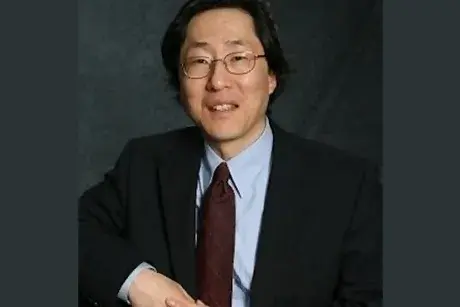Distinguished Research Professor: John Chung
A popular teacher and academically prolific scholar, Chung’s work focuses on commercial law – but he’s never been afraid to tackle more “transcendent” issues.

Roger Williams University School of Law is proud to announce that Professor John Chung has been appointed as its Distinguished Research Professor. The two-year appointment is effective July 1, 2020 and runs through June 30, 2022.
“Since joining the faculty in 2006, John has written 15 articles by my count – an average of one per year,” said Dean Michael J. Yelnosky. “They have appeared in specialty journals at Northwestern, Duke, UC-Hastings, BU, and North Carolina, and two of his most recent articles appeared in the general law reviews at Oregon and Pitt.”
Chung has also authored articles for the Roger Williams University Law Review, including one that celebrated alumni on the occasion of the school’s 20th anniversary, and another analyzing the role of oral statements in the making of municipal contracts, in particular contracts entered into by the City of Providence.
“John’s scholarship focuses on commercial law, including bankruptcy and international commercial law; public international law; and, most recently, cybersecurity,” Yelnosky noted. “Some of his commercial law work is doctrinally quite technical and beyond my comfort zone, but John also addresses some transcendent issues in his scholarship.”
A prime example is Money as Simulacrum: The Legal Nature and Reality of Money, 5 Hastings Bus. L.J. 109 (2009).
‘I expected that piece to be about payment systems and banking law,” Yelnosky said. “Instead, John writes about the history of money and about how the work of two French postmodernist literary theorists is relevant to the questions whether our current conception of money as a pure abstraction is sustainable and whether it is responsible for the dramatic increase in income inequality.”
On the Balkinization Blog, Frank Pasquale called the article “fascinating.”
Another example is Wealth Inequality as Explained by Quantitative Easing and Law’s Inertia, 85 UMKC L. Rev. 275 (2017), where Chung considers wealth inequality head on and argues, by reference to Dred Scott, Lochner, and Citizen’s United that, because of its tendency to favor and reflect the preferences of the powerful, law cannot be relied on to provide a solution.
Chung’s most recent articles have focused on cybersecurity, with one piece arguing that it’s unwise to rely on voluntary efforts by private sector actors to protect critical infrastructure from cyber-attacks, while another examines whether international law prohibits one nation from launching a cyber-attack on another nation’s critical infrastructure.
“In these pieces, John acknowledges that he is wrestling with a bigger issue,” Yelnosky explained, “He’s exploring whether the challenges posed by cyber-operations may be analyzed under existing systems of rules and structures, or whether cyber issues are so fundamentally new and different that a new set of rules and structures is required.”
Keenly interested in the relationship between consumer debt and bankruptcy, Professor Chung has testified before the U.S. Senate Judiciary Committee on bankruptcy legislation regarding abusive credit card practices. A prolific author, his articles cover many legal topics including bankruptcy, international law, and contracts. Academia is not alone in recognizing Professor Chung’s talents. Both the RWU 2009 and 2012 graduating classes voted him Professor of the Year.
Many of Professor Chung’s remarkable teaching skills come from his extensive background as a commercial lawyer. As a partner in the Los Angeles firm Katten Munchen & Zavis, Chung devoted a significant portion of his practice representing secured creditors in bankruptcy court. While employed for the United Nations, he worked for the Compensation Commission originated by the UN to process claims and award compensation for losses resulting from Iraq’s invasion of Kuwait in 1990. Chung teaches contracts, sales, secured transactions and bankruptcy at RWU.
Professor Chung earned his B.A. at Washington University and his J.D. at Harvard. A list of his publications can be found here.
